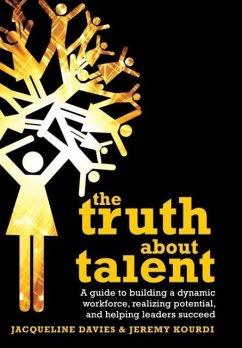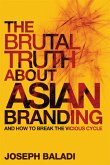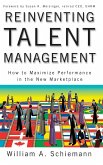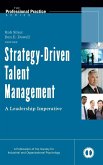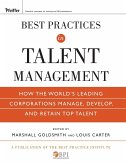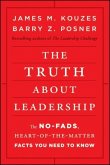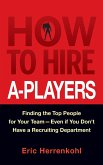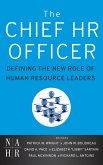Jacqueline Davies, Jeremy Kourdi
The Truth about Talent
A Guide to Building a Dynamic Workforce, Realizing Potential and Helping Leaders Succeed
Jacqueline Davies, Jeremy Kourdi
The Truth about Talent
A Guide to Building a Dynamic Workforce, Realizing Potential and Helping Leaders Succeed
- Gebundenes Buch
- Merkliste
- Auf die Merkliste
- Bewerten Bewerten
- Teilen
- Produkt teilen
- Produkterinnerung
- Produkterinnerung
Understanding the truth about talent in all forms is a vital step in developing a long-term, sustainable, successful organization. The Truth about Talent explores the different ways for organizations to recognize talent from people at different stages of their career, as well as from people with different experiences and aspirations. With a forward-thinking approach, this resource provides qualitative and quantitative international research on talent management and employee engagement, as well as an original survey of executives. This book shows the fundamental changes in line to enhance employees and the economy.…mehr
Andere Kunden interessierten sich auch für
![The Brutal Truth about Asian Branding The Brutal Truth about Asian Branding]() Joseph BaladiThe Brutal Truth about Asian Branding36,99 €
Joseph BaladiThe Brutal Truth about Asian Branding36,99 €![Reinventing Talent Management Reinventing Talent Management]() William A SchiemannReinventing Talent Management31,99 €
William A SchiemannReinventing Talent Management31,99 €![Strategy-Driven Talent Management Strategy-Driven Talent Management]() Rob Silzer / Ben E. DowellStrategy-Driven Talent Management104,99 €
Rob Silzer / Ben E. DowellStrategy-Driven Talent Management104,99 €![Best Practices in Talent Management Best Practices in Talent Management]() Marshall GoldsmithBest Practices in Talent Management119,99 €
Marshall GoldsmithBest Practices in Talent Management119,99 €![The Truth about Leadership The Truth about Leadership]() James M. KouzesThe Truth about Leadership28,99 €
James M. KouzesThe Truth about Leadership28,99 €![How to Hire A-Players How to Hire A-Players]() Eric HerrenkohlHow to Hire A-Players20,99 €
Eric HerrenkohlHow to Hire A-Players20,99 €![The Chief HR Officer The Chief HR Officer]() The Chief HR Officer61,99 €
The Chief HR Officer61,99 €-
-
-
Understanding the truth about talent in all forms is a vital step in developing a long-term, sustainable, successful organization. The Truth about Talent explores the different ways for organizations to recognize talent from people at different stages of their career, as well as from people with different experiences and aspirations. With a forward-thinking approach, this resource provides qualitative and quantitative international research on talent management and employee engagement, as well as an original survey of executives. This book shows the fundamental changes in line to enhance employees and the economy.
Produktdetails
- Produktdetails
- Verlag: John Wiley & Sons / Wiley
- Seitenzahl: 272
- Erscheinungstermin: 14. September 2010
- Englisch
- Abmessung: 235mm x 157mm x 21mm
- Gewicht: 613g
- ISBN-13: 9780470748824
- ISBN-10: 0470748826
- Artikelnr.: 28171414
- Herstellerkennzeichnung
- Libri GmbH
- Europaallee 1
- 36244 Bad Hersfeld
- gpsr@libri.de
- Verlag: John Wiley & Sons / Wiley
- Seitenzahl: 272
- Erscheinungstermin: 14. September 2010
- Englisch
- Abmessung: 235mm x 157mm x 21mm
- Gewicht: 613g
- ISBN-13: 9780470748824
- ISBN-10: 0470748826
- Artikelnr.: 28171414
- Herstellerkennzeichnung
- Libri GmbH
- Europaallee 1
- 36244 Bad Hersfeld
- gpsr@libri.de
Jacqueline Davies is a respected HR leader with 18 years' experience in strategic human resource management. She has led the global talent agendas in two FTSE top 10 companies and driven executive integration programmes for two of the largest acquisitions in corporate history. Jacqueline is a recognised thought leader in how companies can deploy talent strategies to achieve commercial advantage. Jacqueline is a non-executive director of two charities and has recently been appointed to the Advisory Board on Leadership Ethics at the Bristol Business School. She can be contacted at truthabouttalent@btinternet.com. Jeremy Kourdi is a writer and executive coach. His experience includes commercial leadership, writing and coaching expertise gained with leading brands. During his career he has worked in Europe, North America and the Middle East with a range of organizations including HSBC, Pearson, London Business School, IMD and he was Senior Vice-President with The Economist Group. For further information visit www.LeadershipExpertise.com.
Introduction 1
Recognizing the talent 'doom loop' 3
About our research 6
Seven key insights 6
How this book is organized 7
1 We Are All Talent Now 13
What we mean by talent 19
Talent ecology and the truth about talent 20
The truth about talent 24
We are all talent now 27
Talent is abundant and diverse 27
The talented are those who generate value, not merely those who can get to
the top 27
Potential is discretionary 27
Growing and engaging talent is at the core of leadership 28
HR must reinvent itself to deliver practices for a 'workforce of one' 28
Talented people are attracted to talented places 28
2 A New Way of Thinking About Talent 31
How organizations think about talent 31
What we mean by talent 32
How talent management is changing 34
A fragmented, fluctuating supply of labour 36
From the credit crunch to the capability crunch 37
Connected consumption 38
Where we are today: the problem with current views of 'talent' in
organizations 39
The belief that the future can be managed: from succession to scenario
planning 40
The belief that we can spot our future leaders today (and manage their
careers) 42
The march of the 'high potentials' 42
Potential for what? 44
Being insightful 45
Moving beyond the usual suspects ... 47
The rise of discretionary potential 49
A more tangible view of talent 50
How do you make a difference? 52
Leadership reflections 52
3 Talent Diversity: You Need to Believe It to See It 55
The link between talent and diversity 55
Meritocracy and diversity - sources of talent 56
Boiled frogs and Chilean potatoes ... why diversity is vital 58
Diversity - the best way to future-proof your business and avoid
homogeneity 60
A new war for talent 63
Practical actions that will begin making a difference 64
Leadership reflections 66
4 Strategy - Beginning With the End in Mind 69
Strategy - the first priority 71
Future thinking and scenarios 72
Why future thinking and scenarios are valuable 72
Learning from the past, preparing for the future 76
Checklist: using scenario thinking 77
Developing strategy 80
The essence of successful strategies 80
Checklist: developing your strategy 82
Implementing strategy 83
Communicating strategy 84
HR strategy at work 85
Strategic tools for HR 86
1. Devising the right people strategy 87
2. Designing and refining the organization's structure and focus 87
3. Influencing and enhancing the culture and environment 87
4. Developing future leaders 88
5. Understanding critical capabilities 88
6. Managing performance and reward 88
7. Involving people and increasing satisfaction 89
8. Learning and managing knowledge 89
9. Staying focused, flexible and managing HR services 89
Leadership reflections 90
5 Hire and Wire: Developing Your Organization's Talent Ecology 93
Finding and nurturing talent 93
Managing your talent ecology 95
The impact of the external market 96
The pivotal link with strategy 96
Talent - a valuable Trojan horse 97
Talent loves talented company 98
The forgotten role of structure 100
From structure chart to social capital 101
The importance of networks 103
The nature of talented teams 104
Adopting new habits 105
How culture can make or break a talent strategy 106
Digging big holes 107
The revenge of the bell curve 109
Cultures that attract talent 110
Developing the talent ecology 113
Aiming for a 'fly wheel' effect 114
Leadership reflections 114
6 Getting Personal: The Workforce of One 117
Bringing your talents to work 117
Life just got personal - the trend to mass customization 118
The rise of the employer brand 119
The value of segmentation 120
Understanding memetics 122
Segmenting talent 124
Techniques for rating performance 124
Using employee data 125
Getting beneath the Employee Value Proposition 126
Leadership reflections 128
7 Engaging With Talent 131
Employee engagement: what it is and why it matters 131
The benefits of engagement 132
What affects employee engagement? 133
Three-factor theory 136
Engagement and the three factors 138
Checklist: connecting employee enthusiasm with business success 139
The rule of 150: Gore Associates 145
Sears and the service-profit chain 147
Creating a climate for engagement 148
Understanding what doesn't work 149
Getting people engaged 149
Leadership reflections 151
8 The Meaning of Work 155
The meaning of work 155
The importance of meaningful work 159
People - more than 'human resources' 159
Making work more meaningful 160
Leadership refl ections 162
9 Leading for Talent 165
The challenges of 21st century leadership 166
Globalization, interconnectedness and interdependence 168
Increasing complexity 170
The challenge of sustainable growth 171
The need for innovation 172
Changing attitudes, rising expectations 173
Organizations are changing 176
Knowledge matters 177
A new approach to leadership 178
The business case 179
People are the answer (specifically, their head, heart and guts) 180
Understanding your leadership style 181
Understanding different leadership styles 182
Taking leadership seriously 184
Leadership reflections 188
10 Techniques for Realizing Talent in Your Whole Workforce 191
Leading with your heart 192
Balance the needs of individuals and the business 193
Know yourself and connect emotionally to others 193
Stay self-aware 194
Develop empathy 195
Remain in control 196
Use different styles of working 196
Develop emotional intelligence (EQ) 198
Inspire trust 199
Use visioning to increase collaboration and understanding 215
Develop creativity and innovation 217
Build a diverse team and empathic approach 218
Using intellect, intelligence and insight 219
Rethinking 219
Reframing 220
Focusing on results and getting things done 221
Developing and articulating a point of view 222
Courageous leadership 223
Taking risks with incomplete data 223
Balancing risk and reward 224
Acting with unyielding integrity 224
Communicating 225
Empowering people 227
Coaching and developing talent 229
Conclusion: Creating a Talent Flywheel 235
See talent in context 237
Treat everyone as talent 238
Focus on value creation 238
Make work personal 239
Build everyone's capability 239
Take leadership seriously 240
Tend your talent ecology 240
Appendix: Researching the Truth About Talent 243
Research acknowledgements 245
Index 249
Recognizing the talent 'doom loop' 3
About our research 6
Seven key insights 6
How this book is organized 7
1 We Are All Talent Now 13
What we mean by talent 19
Talent ecology and the truth about talent 20
The truth about talent 24
We are all talent now 27
Talent is abundant and diverse 27
The talented are those who generate value, not merely those who can get to
the top 27
Potential is discretionary 27
Growing and engaging talent is at the core of leadership 28
HR must reinvent itself to deliver practices for a 'workforce of one' 28
Talented people are attracted to talented places 28
2 A New Way of Thinking About Talent 31
How organizations think about talent 31
What we mean by talent 32
How talent management is changing 34
A fragmented, fluctuating supply of labour 36
From the credit crunch to the capability crunch 37
Connected consumption 38
Where we are today: the problem with current views of 'talent' in
organizations 39
The belief that the future can be managed: from succession to scenario
planning 40
The belief that we can spot our future leaders today (and manage their
careers) 42
The march of the 'high potentials' 42
Potential for what? 44
Being insightful 45
Moving beyond the usual suspects ... 47
The rise of discretionary potential 49
A more tangible view of talent 50
How do you make a difference? 52
Leadership reflections 52
3 Talent Diversity: You Need to Believe It to See It 55
The link between talent and diversity 55
Meritocracy and diversity - sources of talent 56
Boiled frogs and Chilean potatoes ... why diversity is vital 58
Diversity - the best way to future-proof your business and avoid
homogeneity 60
A new war for talent 63
Practical actions that will begin making a difference 64
Leadership reflections 66
4 Strategy - Beginning With the End in Mind 69
Strategy - the first priority 71
Future thinking and scenarios 72
Why future thinking and scenarios are valuable 72
Learning from the past, preparing for the future 76
Checklist: using scenario thinking 77
Developing strategy 80
The essence of successful strategies 80
Checklist: developing your strategy 82
Implementing strategy 83
Communicating strategy 84
HR strategy at work 85
Strategic tools for HR 86
1. Devising the right people strategy 87
2. Designing and refining the organization's structure and focus 87
3. Influencing and enhancing the culture and environment 87
4. Developing future leaders 88
5. Understanding critical capabilities 88
6. Managing performance and reward 88
7. Involving people and increasing satisfaction 89
8. Learning and managing knowledge 89
9. Staying focused, flexible and managing HR services 89
Leadership reflections 90
5 Hire and Wire: Developing Your Organization's Talent Ecology 93
Finding and nurturing talent 93
Managing your talent ecology 95
The impact of the external market 96
The pivotal link with strategy 96
Talent - a valuable Trojan horse 97
Talent loves talented company 98
The forgotten role of structure 100
From structure chart to social capital 101
The importance of networks 103
The nature of talented teams 104
Adopting new habits 105
How culture can make or break a talent strategy 106
Digging big holes 107
The revenge of the bell curve 109
Cultures that attract talent 110
Developing the talent ecology 113
Aiming for a 'fly wheel' effect 114
Leadership reflections 114
6 Getting Personal: The Workforce of One 117
Bringing your talents to work 117
Life just got personal - the trend to mass customization 118
The rise of the employer brand 119
The value of segmentation 120
Understanding memetics 122
Segmenting talent 124
Techniques for rating performance 124
Using employee data 125
Getting beneath the Employee Value Proposition 126
Leadership reflections 128
7 Engaging With Talent 131
Employee engagement: what it is and why it matters 131
The benefits of engagement 132
What affects employee engagement? 133
Three-factor theory 136
Engagement and the three factors 138
Checklist: connecting employee enthusiasm with business success 139
The rule of 150: Gore Associates 145
Sears and the service-profit chain 147
Creating a climate for engagement 148
Understanding what doesn't work 149
Getting people engaged 149
Leadership reflections 151
8 The Meaning of Work 155
The meaning of work 155
The importance of meaningful work 159
People - more than 'human resources' 159
Making work more meaningful 160
Leadership refl ections 162
9 Leading for Talent 165
The challenges of 21st century leadership 166
Globalization, interconnectedness and interdependence 168
Increasing complexity 170
The challenge of sustainable growth 171
The need for innovation 172
Changing attitudes, rising expectations 173
Organizations are changing 176
Knowledge matters 177
A new approach to leadership 178
The business case 179
People are the answer (specifically, their head, heart and guts) 180
Understanding your leadership style 181
Understanding different leadership styles 182
Taking leadership seriously 184
Leadership reflections 188
10 Techniques for Realizing Talent in Your Whole Workforce 191
Leading with your heart 192
Balance the needs of individuals and the business 193
Know yourself and connect emotionally to others 193
Stay self-aware 194
Develop empathy 195
Remain in control 196
Use different styles of working 196
Develop emotional intelligence (EQ) 198
Inspire trust 199
Use visioning to increase collaboration and understanding 215
Develop creativity and innovation 217
Build a diverse team and empathic approach 218
Using intellect, intelligence and insight 219
Rethinking 219
Reframing 220
Focusing on results and getting things done 221
Developing and articulating a point of view 222
Courageous leadership 223
Taking risks with incomplete data 223
Balancing risk and reward 224
Acting with unyielding integrity 224
Communicating 225
Empowering people 227
Coaching and developing talent 229
Conclusion: Creating a Talent Flywheel 235
See talent in context 237
Treat everyone as talent 238
Focus on value creation 238
Make work personal 239
Build everyone's capability 239
Take leadership seriously 240
Tend your talent ecology 240
Appendix: Researching the Truth About Talent 243
Research acknowledgements 245
Index 249
Introduction 1
Recognizing the talent 'doom loop' 3
About our research 6
Seven key insights 6
How this book is organized 7
1 We Are All Talent Now 13
What we mean by talent 19
Talent ecology and the truth about talent 20
The truth about talent 24
We are all talent now 27
Talent is abundant and diverse 27
The talented are those who generate value, not merely those who can get to
the top 27
Potential is discretionary 27
Growing and engaging talent is at the core of leadership 28
HR must reinvent itself to deliver practices for a 'workforce of one' 28
Talented people are attracted to talented places 28
2 A New Way of Thinking About Talent 31
How organizations think about talent 31
What we mean by talent 32
How talent management is changing 34
A fragmented, fluctuating supply of labour 36
From the credit crunch to the capability crunch 37
Connected consumption 38
Where we are today: the problem with current views of 'talent' in
organizations 39
The belief that the future can be managed: from succession to scenario
planning 40
The belief that we can spot our future leaders today (and manage their
careers) 42
The march of the 'high potentials' 42
Potential for what? 44
Being insightful 45
Moving beyond the usual suspects ... 47
The rise of discretionary potential 49
A more tangible view of talent 50
How do you make a difference? 52
Leadership reflections 52
3 Talent Diversity: You Need to Believe It to See It 55
The link between talent and diversity 55
Meritocracy and diversity - sources of talent 56
Boiled frogs and Chilean potatoes ... why diversity is vital 58
Diversity - the best way to future-proof your business and avoid
homogeneity 60
A new war for talent 63
Practical actions that will begin making a difference 64
Leadership reflections 66
4 Strategy - Beginning With the End in Mind 69
Strategy - the first priority 71
Future thinking and scenarios 72
Why future thinking and scenarios are valuable 72
Learning from the past, preparing for the future 76
Checklist: using scenario thinking 77
Developing strategy 80
The essence of successful strategies 80
Checklist: developing your strategy 82
Implementing strategy 83
Communicating strategy 84
HR strategy at work 85
Strategic tools for HR 86
1. Devising the right people strategy 87
2. Designing and refining the organization's structure and focus 87
3. Influencing and enhancing the culture and environment 87
4. Developing future leaders 88
5. Understanding critical capabilities 88
6. Managing performance and reward 88
7. Involving people and increasing satisfaction 89
8. Learning and managing knowledge 89
9. Staying focused, flexible and managing HR services 89
Leadership reflections 90
5 Hire and Wire: Developing Your Organization's Talent Ecology 93
Finding and nurturing talent 93
Managing your talent ecology 95
The impact of the external market 96
The pivotal link with strategy 96
Talent - a valuable Trojan horse 97
Talent loves talented company 98
The forgotten role of structure 100
From structure chart to social capital 101
The importance of networks 103
The nature of talented teams 104
Adopting new habits 105
How culture can make or break a talent strategy 106
Digging big holes 107
The revenge of the bell curve 109
Cultures that attract talent 110
Developing the talent ecology 113
Aiming for a 'fly wheel' effect 114
Leadership reflections 114
6 Getting Personal: The Workforce of One 117
Bringing your talents to work 117
Life just got personal - the trend to mass customization 118
The rise of the employer brand 119
The value of segmentation 120
Understanding memetics 122
Segmenting talent 124
Techniques for rating performance 124
Using employee data 125
Getting beneath the Employee Value Proposition 126
Leadership reflections 128
7 Engaging With Talent 131
Employee engagement: what it is and why it matters 131
The benefits of engagement 132
What affects employee engagement? 133
Three-factor theory 136
Engagement and the three factors 138
Checklist: connecting employee enthusiasm with business success 139
The rule of 150: Gore Associates 145
Sears and the service-profit chain 147
Creating a climate for engagement 148
Understanding what doesn't work 149
Getting people engaged 149
Leadership reflections 151
8 The Meaning of Work 155
The meaning of work 155
The importance of meaningful work 159
People - more than 'human resources' 159
Making work more meaningful 160
Leadership refl ections 162
9 Leading for Talent 165
The challenges of 21st century leadership 166
Globalization, interconnectedness and interdependence 168
Increasing complexity 170
The challenge of sustainable growth 171
The need for innovation 172
Changing attitudes, rising expectations 173
Organizations are changing 176
Knowledge matters 177
A new approach to leadership 178
The business case 179
People are the answer (specifically, their head, heart and guts) 180
Understanding your leadership style 181
Understanding different leadership styles 182
Taking leadership seriously 184
Leadership reflections 188
10 Techniques for Realizing Talent in Your Whole Workforce 191
Leading with your heart 192
Balance the needs of individuals and the business 193
Know yourself and connect emotionally to others 193
Stay self-aware 194
Develop empathy 195
Remain in control 196
Use different styles of working 196
Develop emotional intelligence (EQ) 198
Inspire trust 199
Use visioning to increase collaboration and understanding 215
Develop creativity and innovation 217
Build a diverse team and empathic approach 218
Using intellect, intelligence and insight 219
Rethinking 219
Reframing 220
Focusing on results and getting things done 221
Developing and articulating a point of view 222
Courageous leadership 223
Taking risks with incomplete data 223
Balancing risk and reward 224
Acting with unyielding integrity 224
Communicating 225
Empowering people 227
Coaching and developing talent 229
Conclusion: Creating a Talent Flywheel 235
See talent in context 237
Treat everyone as talent 238
Focus on value creation 238
Make work personal 239
Build everyone's capability 239
Take leadership seriously 240
Tend your talent ecology 240
Appendix: Researching the Truth About Talent 243
Research acknowledgements 245
Index 249
Recognizing the talent 'doom loop' 3
About our research 6
Seven key insights 6
How this book is organized 7
1 We Are All Talent Now 13
What we mean by talent 19
Talent ecology and the truth about talent 20
The truth about talent 24
We are all talent now 27
Talent is abundant and diverse 27
The talented are those who generate value, not merely those who can get to
the top 27
Potential is discretionary 27
Growing and engaging talent is at the core of leadership 28
HR must reinvent itself to deliver practices for a 'workforce of one' 28
Talented people are attracted to talented places 28
2 A New Way of Thinking About Talent 31
How organizations think about talent 31
What we mean by talent 32
How talent management is changing 34
A fragmented, fluctuating supply of labour 36
From the credit crunch to the capability crunch 37
Connected consumption 38
Where we are today: the problem with current views of 'talent' in
organizations 39
The belief that the future can be managed: from succession to scenario
planning 40
The belief that we can spot our future leaders today (and manage their
careers) 42
The march of the 'high potentials' 42
Potential for what? 44
Being insightful 45
Moving beyond the usual suspects ... 47
The rise of discretionary potential 49
A more tangible view of talent 50
How do you make a difference? 52
Leadership reflections 52
3 Talent Diversity: You Need to Believe It to See It 55
The link between talent and diversity 55
Meritocracy and diversity - sources of talent 56
Boiled frogs and Chilean potatoes ... why diversity is vital 58
Diversity - the best way to future-proof your business and avoid
homogeneity 60
A new war for talent 63
Practical actions that will begin making a difference 64
Leadership reflections 66
4 Strategy - Beginning With the End in Mind 69
Strategy - the first priority 71
Future thinking and scenarios 72
Why future thinking and scenarios are valuable 72
Learning from the past, preparing for the future 76
Checklist: using scenario thinking 77
Developing strategy 80
The essence of successful strategies 80
Checklist: developing your strategy 82
Implementing strategy 83
Communicating strategy 84
HR strategy at work 85
Strategic tools for HR 86
1. Devising the right people strategy 87
2. Designing and refining the organization's structure and focus 87
3. Influencing and enhancing the culture and environment 87
4. Developing future leaders 88
5. Understanding critical capabilities 88
6. Managing performance and reward 88
7. Involving people and increasing satisfaction 89
8. Learning and managing knowledge 89
9. Staying focused, flexible and managing HR services 89
Leadership reflections 90
5 Hire and Wire: Developing Your Organization's Talent Ecology 93
Finding and nurturing talent 93
Managing your talent ecology 95
The impact of the external market 96
The pivotal link with strategy 96
Talent - a valuable Trojan horse 97
Talent loves talented company 98
The forgotten role of structure 100
From structure chart to social capital 101
The importance of networks 103
The nature of talented teams 104
Adopting new habits 105
How culture can make or break a talent strategy 106
Digging big holes 107
The revenge of the bell curve 109
Cultures that attract talent 110
Developing the talent ecology 113
Aiming for a 'fly wheel' effect 114
Leadership reflections 114
6 Getting Personal: The Workforce of One 117
Bringing your talents to work 117
Life just got personal - the trend to mass customization 118
The rise of the employer brand 119
The value of segmentation 120
Understanding memetics 122
Segmenting talent 124
Techniques for rating performance 124
Using employee data 125
Getting beneath the Employee Value Proposition 126
Leadership reflections 128
7 Engaging With Talent 131
Employee engagement: what it is and why it matters 131
The benefits of engagement 132
What affects employee engagement? 133
Three-factor theory 136
Engagement and the three factors 138
Checklist: connecting employee enthusiasm with business success 139
The rule of 150: Gore Associates 145
Sears and the service-profit chain 147
Creating a climate for engagement 148
Understanding what doesn't work 149
Getting people engaged 149
Leadership reflections 151
8 The Meaning of Work 155
The meaning of work 155
The importance of meaningful work 159
People - more than 'human resources' 159
Making work more meaningful 160
Leadership refl ections 162
9 Leading for Talent 165
The challenges of 21st century leadership 166
Globalization, interconnectedness and interdependence 168
Increasing complexity 170
The challenge of sustainable growth 171
The need for innovation 172
Changing attitudes, rising expectations 173
Organizations are changing 176
Knowledge matters 177
A new approach to leadership 178
The business case 179
People are the answer (specifically, their head, heart and guts) 180
Understanding your leadership style 181
Understanding different leadership styles 182
Taking leadership seriously 184
Leadership reflections 188
10 Techniques for Realizing Talent in Your Whole Workforce 191
Leading with your heart 192
Balance the needs of individuals and the business 193
Know yourself and connect emotionally to others 193
Stay self-aware 194
Develop empathy 195
Remain in control 196
Use different styles of working 196
Develop emotional intelligence (EQ) 198
Inspire trust 199
Use visioning to increase collaboration and understanding 215
Develop creativity and innovation 217
Build a diverse team and empathic approach 218
Using intellect, intelligence and insight 219
Rethinking 219
Reframing 220
Focusing on results and getting things done 221
Developing and articulating a point of view 222
Courageous leadership 223
Taking risks with incomplete data 223
Balancing risk and reward 224
Acting with unyielding integrity 224
Communicating 225
Empowering people 227
Coaching and developing talent 229
Conclusion: Creating a Talent Flywheel 235
See talent in context 237
Treat everyone as talent 238
Focus on value creation 238
Make work personal 239
Build everyone's capability 239
Take leadership seriously 240
Tend your talent ecology 240
Appendix: Researching the Truth About Talent 243
Research acknowledgements 245
Index 249

